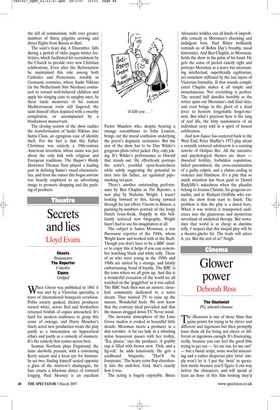Secrets and lies
Lloyd Evans
Ghosts Pentameters The Reporter Cottesloe Equus Gielgud When Ghosts was published in 1881 it was met by a Victorian speciality, a wave of international bourgeois revulsion. Polite society quaked, theatre producers turned white, actors fled and booksellers returned boxfuls of copies untouched. It’s hard for modern audiences to grasp this sense of outrage, and Harry Meacher’s finely acted new production treats the play partly as a lamentation on hypocritical ethics and partly as a comedy of manners. It’s the comedy that comes across best.
Seamus Newham plays Engstrand, the lame alcoholic peasant, with a convincing Kerry accent and a keen eye for humour. In act two, finding himself seated opposite a glass of the mistress’s champagne, his face enacts a hilarious dance of tortured longing. Paul Mooney is an excellent Pastor Manders who, despite bearing a strange resemblance to John Lennon, brings out the moral confusion underlying the priest’s dogmatic certainties. But the star of the show has to be Dan Wilder’s gorgeous plum velvet jacket. Hey, only joking. It’s Wilder’s performance as Oswald that stands out. He effortlessly portrays the artist’s youthful open-heartedness while subtly suggesting the potential to turn into his father, an egoistical pipesmoking sex-pest.
There’s another outstanding performance by Ben Chaplin in The Reporter, a new play by Nicholas Wright. I wasn’t looking forward to this, having yawned through his last effort, Vincent in Brixton, a painting-by-numbers portrait of the loopy Dutch Jesus-freak. Happily in this brilliantly textured new biography, Wright hasn’t had to use his imagination at all.
The subject is James Mossman, a star Panorama reporter of the 1960s, whom Wright knew and worked with at the Beeb. Though you don’t have to be a BBC insider to enjoy this it helps if you can remember watching black and white telly. Those of us who were young in the 1950s and 1960s are united by a strange, and faintly embarrassing, bond of loyalty. The BBC is the town where we all grew up. And this is a wonderful evocation of the world we all watched on the ‘gogglebox’ as it was called. The BBC back then was an austere, closeknit community dedicated to a naive dream. They wanted TV to raise up the masses. Wonderful fools. We now know that the contrary ideal prevailed and that the masses dragged down TV. Never mind.
The monastic atmosphere of the Lime Grove studios is evoked in beautiful little details. Mossman meets a producer in a dim corridor. A fat tea lady in a whistling nylon housecoat passes with her trolley. ‘Tea, please,’ says the producer. A grubby cup is filled with brown stew. ‘Ooh, and a fig-roll,’ he adds luxuriously. He gets a cardboard briquette. ‘That’ll be fourpence.’ The heavy coins flop cheerlessly into the cash-box. God, that’s exactly how it was.
The acting is hugely enjoyable. Bruce Alexander winkles out all kinds of improbable comedy as Mossman’s charming and indulgent boss. Paul Ritter brilliantly reminds us of Robin Day’s breathy, nasal histrionics. And Ben Chaplin, as Mossman, holds the show in the palm of his hand. He gets the sense of period exactly right and portrays Mossman as a suave but unassuming intellectual, superficially egalitarian, yet somehow stiffened by the last layers of Victorian formality. If that sounds complicated Chaplin makes it all simple and instantaneous. Not everything is perfect. The second half dawdles horribly as the writer spins out Mossman’s dull final days, and even brings in the ghost of a dead lover to bestrew forgettable forget-menots. But what’s precious here is the tang of real life, the bitty randomness of an individual story told in a spirit of honest celebration.
And now Equus has cantered back to the West End. Peter Shaffer’s 1973 play about a sexually tortured adolescent is a cunning rewrite of Oedipus Rex. All the narrative and psychological themes are there thwarted fertility, forbidden copulation, failed parenthood, the cross-examination of a guilty culprit, and a climax ending in violence and blindness. It’s a pity that so much attention has been paid to Daniel Radcliffe’s nakedness when the plaudits belong to Joanna Christie, his gorgeous conudist, and to Richard Griffiths who carries the show from start to finish. The problem is that the play is a dated bore. When it was written it transported audiences into the glamorous and mysterious neverland of analytical therapy. But nowadays that world is as cheap as daytime telly. I suspect that this insipid play will be a theatre-ghetto hit. The trade will adore it, yes. But the rest of us? Neigh.










































































 Previous page
Previous page